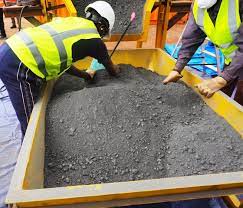The fine coal trial resumed on Monday 27 November 2023 at the Tribunal de Grande Instance in Ouaga I. The Managing Director of Essakane was called to the stand to answer questions from the public prosecutor about the figures in the expert report compared with Essakane’s statements. Do the figures declared by Essakane tally with those in the experts’ report?
Once the Managing Director of Essakane was on the stand, the prosecutor opened the proceedings. He asked for explanations of the difference between the 40% moisture content in the Essakane fine coal and the moisture content given by the experts.
“This variation is normal. It’s because of the time that elapsed before the experts came to do their analysis. Even if the experts do another analysis, they will find a different value,” replied the CEO of Essakane. At the same time, he points out that the figures produced by Essakane are in line with those in the expert report.
The prosecutor then came back to the case. “Perhaps we don’t have the same expert reports. If you compare your figures, i.e. on content and moisture content, the figures are far from those of the legal experts”. But for Essakane, these differences can be explained by the time taken for the experts to carry out their analysis.
“Are you talking about the moisture content of the fine coal or the cargo?” asked the prosecutor, clearly dissatisfied with the CEO’s answers. “I’m talking about the cargo,” retorted the CEO.
Following this reply, the prosecutor asked what the Essakane cargo consisted of. The CEO replied that their cargo consisted of fine coal and by-products.
“These by-products, did you declare them?”, asks the prosecutor. “Our declaration is consistent with the contents of the shipment,” replies Essakane’s CEO.
Sensing that the debates were dragging on the question of the moisture content and the content of the cargo, the president of the court invited the prosecutor to move forward on these issues.
The prosecutor thus attacked another aspect of Essakane’s statements. “According to the experts, your cargo is made up of only 34% fine coal, if we take into account the 850 micron sieve, which is false (editor’s note: according to the prosecutor, this sieve favours Essakane). How do you explain that?” In its reply, Essakane said that this could be explained by the fact that the experts had not used the right sieve, which is 1 mm.
Questions then turned to the 1mm sieve and the by-products (solids, slag, pulp) found in the cargo. Essakane claims to be able to process these by-products in Burkina Faso today, unlike when the shipment was seized.
To decide which sieve to use, the president of the court called in the legal experts.
“At Essakane, in their process, the coal goes through a 1mm sieve, then through a 630 micron sieve to finish recovering the fine coal,” explains one of the experts.
“Is it possible to recover fine coal from a 1mm sieve?” the prosecutor asked the experts. “No,” they replied.
“So the 630 micron sieve is used to recover the fine coal?” asked the prosecutor. “Yes,” replied the experts.
However, the State’s lawyers also pointed out the inconsistencies between the figures given by Essakane and those in the expert report. The hearing on 27 November 2023 was adjourned over the debates on the figures.
#Mines_Actu_Burkina









